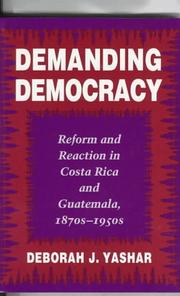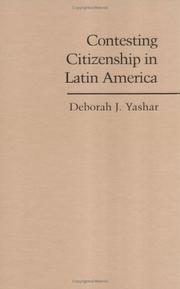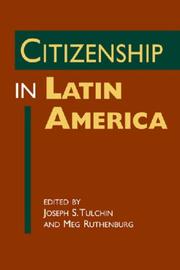| Listing 1 - 10 of 10 |
Sort by
|

ISBN: 0804727902 0804728739 Year: 1997 Publisher: Stanford, Calif. : Stanford University Press,
Abstract | Keywords | Export | Availability | Bookmark
 Loading...
Loading...Choose an application
- Reference Manager
- EndNote
- RefWorks (Direct export to RefWorks)
This book uses case studies of Costa Rica and Guatemala to explore the origins of democracy and authoritarianism, developing a novel theoretical approach based around the concept of coalition. Costa Rica is the longest-standing and arguably the most stable democracy in Latin America, while Guatemala has among the longest and most brutal records of authoritarian rule in Latin America. The author demonstrates that prior to the 1950s, these two countries followed broadly similar patterns of political change and development. She argues that the democratizing coalition's success in Costa Rica and its failure in Guatemala rested upon the coalition's capacity to redistribute elite property early on and to exercise effective political control of the countryside. The distinct theoretical approach integrates an analysis of the conditions fostering democracy with those conducive to its endurance.
Authoritarianism --- Democracy --- Autoritarisme --- Démocratie --- Costa Rica --- Guatemala --- Politics and government --- Politique et gouvernement --- Politics and government. --- Démocratie

ISBN: 0521827469 0521534801 9780521534802 9780521827461 9780511790966 1107138272 0511790961 0511299192 1280415479 0511114923 0511181450 0511198191 0511115474 9780511115479 9780511114922 9781280415470 9781107138278 9780511299193 9780511181450 9780511198199 Year: 2005 Publisher: Cambridge Cambridge university press
Abstract | Keywords | Export | Availability | Bookmark
 Loading...
Loading...Choose an application
- Reference Manager
- EndNote
- RefWorks (Direct export to RefWorks)
Indigenous people in Latin America have mobilized in unprecedented ways - demanding recognition, equal protection, and subnational autonomy. These are remarkable developments in a region where ethnic cleavages were once universally described as weak. Recently, however, indigenous activists and elected officials have increasingly shaped national political deliberations. Deborah Yashar explains the contemporary and uneven emergence of Latin American indigenous movements - addressing both why indigenous identities have become politically salient in the contemporary period and why they have translated into significant political organizations in some places and not others. She argues that ethnic politics can best be explained through a comparative historical approach that analyzes three factors: changing citizenship regimes, social networks, and political associational space. Her argument provides insight into the fragility and unevenness of Latin America's third wave democracies and has broader implications for the ways in which we theorize the relationship between citizenship, states, identity, and social action.
Indians of South America --- Indigenous peoples --- Citizenship --- Civil rights --- Indiens d'Amérique --- Autochtones --- Citoyenneté --- Droits de l'homme --- Politics and government --- Government relations --- Politique et gouvernement --- Relations avec l'Etat --- South America --- Latin America --- Amérique du Sud --- Amérique latine --- Social conditions --- Condions sociales --- #SBIB:324H72 --- #SBIB:324H74 --- #SBIB:328H32 --- Politieke verandering: conflictlijnen, nationalisme/federalisme --- Politieke verandering: sociale bewegingen --- Instellingen en beleid: Midden en Latijns-Amerika --- Indiens d'Amérique --- Citoyenneté --- Amérique du Sud --- Amérique latine --- Political rights --- Politics and government. --- Civil rights. --- Government relations. --- Race relations. --- Birthright citizenship --- Citizenship (International law) --- National citizenship --- Nationality (Citizenship) --- Political science --- Public law --- Allegiance --- Civics --- Domicile --- Civic rights --- American aborigines --- American Indians --- Law and legislation --- Ethnology --- Social Sciences --- Political Science
Book
ISBN: 1316836207 1316823709 1316832635 1107178479 1316629651 Year: 2018 Publisher: Cambridge : Cambridge University Press,
Abstract | Keywords | Export | Availability | Bookmark
 Loading...
Loading...Choose an application
- Reference Manager
- EndNote
- RefWorks (Direct export to RefWorks)
Why has violence spiked in Latin America's contemporary democracies? What explains its temporal and spatial variation? Analyzing the region's uneven homicide levels, this book maps out a theoretical agenda focusing on three intersecting factors: the changing geography of transnational illicit political economies; the varied capacity and complicity of state institutions tasked with providing law and order; and organizational competition to control illicit territorial enclaves. These three factors inform the emergence of 'homicidal ecologies' (subnational regions most susceptible to violence) in Latin America. After focusing on the contemporary causes of homicidal violence, the book analyzes the comparative historical origins of weak and complicit public security forces and the rare moments in which successful institutional reform takes place. Regional trends in Latin America are evaluated, followed by original case studies of Central America, which claims among the highest homicide rates in the world.
Violence --- Civil war --- Crime --- Democratization --- Democracy --- City crime --- Crime and criminals --- Crimes --- Delinquency --- Felonies --- Misdemeanors --- Urban crime --- Social problems --- Criminal justice, Administration of --- Criminal law --- Criminals --- Criminology --- Transgression (Ethics) --- Civil wars --- Intra-state war --- Rebellions --- Government, Resistance to --- International law --- Revolutions --- War --- Violent behavior --- Social psychology --- Political aspects --- Social aspects --- Economic aspects --- Central America --- Social conditions.
Book
ISBN: 9781316823705 9781107178472 9781316629659 Year: 2018 Publisher: Cambridge Cambridge University Press
Abstract | Keywords | Export | Availability | Bookmark
 Loading...
Loading...Choose an application
- Reference Manager
- EndNote
- RefWorks (Direct export to RefWorks)
Book
ISBN: 9780415875233 9780415875226 9780203860267 9781135280307 9781135280253 9781135280291 Year: 2012 Publisher: New York, N.Y. Routledge
Abstract | Keywords | Export | Availability | Bookmark
 Loading...
Loading...Choose an application
- Reference Manager
- EndNote
- RefWorks (Direct export to RefWorks)
Latin America has been one of the critical areas in the study of comparative politics. The region?s experiments with installing and deepening democracy and promoting alternative modes of economic development have generated intriguing and enduring empirical puzzles. In turn, Latin America?s challenges continue to spawn original and vital work on central questions in comparative politics: about the origins of democracy; about the relationship between state and society; about the nature of citizenship; about the balance between state and market. The richness and diversity of the study of Latin American politics makes it hard to stay abreast of the developments in the many sub-literatures of the field. The Routledge Handbook of Latin American Politics offers an intellectually rigorous overview of the state of the field and a thoughtful guide to the direction of future scholarship. Kingstone and Yashar bring together the leading figures in the study of Latin America to present extensive empirical coverage, new original research, and a cutting-edge examination of the central areas of inquiry in the region.
Comparative government --- Régimes politiques --- Latin America --- Amérique latine --- Politics and government --- Politique et gouvernement --- Libéralisme économique --- Politics --- Amérique latine --- Politique économique --- Conditions sociales --- Relations extérieures --- Libéralisme économique --- Relations extérieures --- Politique économique
Book
ISBN: 1316862240 1316862348 131666158X 1316862445 1316862542 1316862844 1107156793 1316610055 1316861643 Year: 2016 Publisher: New York : Cambridge University Press,
Abstract | Keywords | Export | Availability | Bookmark
 Loading...
Loading...Choose an application
- Reference Manager
- EndNote
- RefWorks (Direct export to RefWorks)
This volume analyzes regime politics in the developing world. By focusing on the civilian, collective actors that forge democracy and sustain it, this book moves beyond materialist arguments focusing on GDP, poverty, and inequality. With case material from four continents, this volume emphasizes the decisive role played by parties and movements in forging democracy against the odds. These pivotal collectivities are consistently the key civilian collectivities that successfully mobilized for democracy, that helped forge enduring democratic institutions, and that shaped the quality of the democracies that emerged; they are the ones tasked with mobilizing along a range of social cleavages, confronting seemingly inhospitable conditions, and coordinating the process of regime change. While the presence of parties and movements alone is not sufficient to explain democracy, their absence is detrimental to enduring democratic regimes. Thus, this volume refocuses our attention on parties and movements as critical mechanisms of regime change.
Political parties --- Democracy --- Parties, Political --- Party systems, Political --- Political party systems --- Political science --- Divided government --- Intra-party disagreements (Political parties) --- Political conventions --- Developing countries --- Emerging nations --- Fourth World --- Global South --- LDC's --- Least developed countries --- Less developed countries --- Newly industrialized countries --- Newly industrializing countries --- NICs (Newly industrialized countries) --- Third World --- Underdeveloped areas --- Underdeveloped countries --- Politics and government
Book
ISBN: 1108902219 1108895832 1108842046 110890159X Year: 2021 Publisher: Cambridge, England : Cambridge University Press,
Abstract | Keywords | Export | Availability | Bookmark
 Loading...
Loading...Choose an application
- Reference Manager
- EndNote
- RefWorks (Direct export to RefWorks)
Latin American states took dramatic steps toward greater inclusion during the late twentieth and early twenty-first Centuries. Bringing together an accomplished group of scholars, this volume examines this shift by introducing three dimensions of inclusion: official recognition of historically excluded groups, access to policymaking, and resource redistribution. Tracing the movement along these dimensions since the 1990s, the editors argue that the endurance of democratic politics, combined with longstanding social inequalities, create the impetus for inclusionary reforms. Diverse chapters explore how factors such as the role of partisanship and electoral clientelism, constitutional design, state capacity, social protest, populism, commodity rents, international diffusion, and historical legacies encouraged or inhibited inclusionary reform during the late 1990s and early 2000s. Featuring original empirical evidence and a strong theoretical framework, the book considers cross-national variation, delves into the surprising paradoxes of inclusion, and identifies the obstacles hindering further fundamental change.
Political participation --- Democracy --- Political culture --- Self-government --- Political science --- Equality --- Representative government and representation --- Republics --- Citizen participation --- Community action --- Community involvement --- Community participation --- Involvement, Community --- Mass political behavior --- Participation, Citizen --- Participation, Community --- Participation, Political --- Political activity --- Political behavior --- Political rights --- Social participation --- Political activists --- Politics, Practical --- Social aspects. --- Social aspects --- Latin America --- Asociación Latinoamericana de Libre Comercio countries --- Neotropical region --- Neotropics --- New World tropics --- Spanish America --- Politics and government --- Social policy
Book
ISBN: 9781108842044 9781108895835 9781108816182 Year: 2021 Publisher: Cambridge Cambridge University Press
Abstract | Keywords | Export | Availability | Bookmark
 Loading...
Loading...Choose an application
- Reference Manager
- EndNote
- RefWorks (Direct export to RefWorks)
Political systems --- anno 1990-1999 --- anno 2000-2009 --- Latin America
Book
ISBN: 9781316661581 9781107156791 9781316610053 Year: 2016 Publisher: New York Cambridge University Press
Abstract | Keywords | Export | Availability | Bookmark
 Loading...
Loading...Choose an application
- Reference Manager
- EndNote
- RefWorks (Direct export to RefWorks)


ISBN: 162637130X 9781626371309 9781588264909 1588264904 Year: 2022 Publisher: Boulder
Abstract | Keywords | Export | Availability | Bookmark
 Loading...
Loading...Choose an application
- Reference Manager
- EndNote
- RefWorks (Direct export to RefWorks)
Is democracy in Latin America in trouble, as many now argue? Or is the increasingly overt political participation of both "average" and marginalized citizens evidence to the contrary? This important collection focuses on citizenship to shed light on the dynamics and obstacles that the region's democracies now face. The authors place citizenship in the context of democratic theory and explore varying conceptions of the term. They also consider a range of challenges to meaningful citizenship. In the final section of the book, practitioners reflect on their experiences in advocating for a more active citizenry, and on ways to promote citizenship in Latin America.
| Listing 1 - 10 of 10 |
Sort by
|

 Search
Search Feedback
Feedback About UniCat
About UniCat  Help
Help News
News